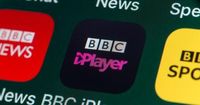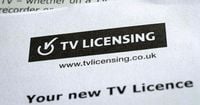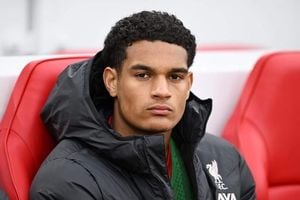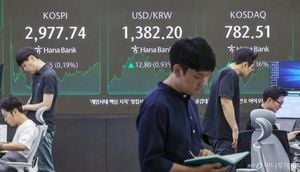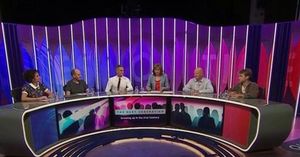In a landmark case that has sent ripples across the UK, households are now racing to reduce their BBC TV Licence fees to zero following a man’s successful court battle. Lee Stuart, a resident of Kirkby, initially applied for a TV licence when he moved into his new home but soon cancelled it after realizing he never watched live television.
Mr. Stuart’s story began in September 2024 when a TV Licensing officer visited his house. During the visit, he explained, “I told him I didn’t pay for a TV licence because I didn’t think I needed one because I don’t watch live TV.” He further clarified that he didn’t even have an aerial installed on his television and that he only used streaming services like Netflix and Amazon Prime through his PlayStation. When asked if he used BBC iPlayer, he replied, “no.” The officer inspected his setup, asked questions about his viewing habits, and read back the declarations Mr. Stuart made. Convinced by the conversation, Mr. Stuart signed a document confirming that he did not watch live TV or use BBC iPlayer.
Despite this, in January 2025, Mr. Stuart received a Single Justice Procedure Notice (SJPN), an official notice alleging he had watched TV without a valid licence. The notice included statements that Mr. Stuart disputed, such as claims that he refused the officer entry and admitted to watching live news. Determined to defend himself, Mr. Stuart represented himself in court at Sefton Magistrates Court.
His defense was straightforward: he did not watch live broadcasts and only used on-demand streaming services, which do not require a TV licence. “I can see why people just accept it, but I knew I was innocent and I wasn’t paying for a TV licence that I didn’t need so I fought it,” he said. The magistrates ultimately dismissed the case due to insufficient evidence. A TV Licensing spokesperson later confirmed that a review following the hearing found no procedural failings, but the court was unconvinced that the case could be proven beyond reasonable doubt.
This victory has sparked a wave of cancellations, with reports indicating that over half a million households scrapped their TV licence fees last year. The BBC has struggled to connect with younger audiences who increasingly turn to streaming platforms like Netflix and YouTube rather than traditional broadcast TV. The £174.50 annual fee covers live TV viewing on any channel, including BBC, ITV, Channel 4, and others, as well as access to BBC iPlayer. However, it does not apply to users who solely watch on-demand or non-live streaming services.
The rules, while straightforward in principle, can be confusing in practice. A TV licence is required if you watch or record live TV on any device or channel, including live streams on platforms such as ITVX, Channel 4’s All4, YouTube’s live broadcasts, or Amazon Prime Video’s live content. Additionally, any use of BBC iPlayer mandates a licence, regardless of whether the content is live or on demand.
Conversely, watching catch-up services like ITVX, All4, or streaming platforms such as Netflix, Disney+, Amazon Prime Video, and Apple TV without live content does not require a licence. Gaming, DVDs, and Blu-rays also fall outside the licence requirement. For example, binge-watching series like "Stranger Things" or "Ted Lasso" on Netflix is perfectly legal without a licence, but tuning into a live Premier League match on Amazon Prime Video would necessitate one.
Despite the clarity of these rules, many people remain unaware of their rights. The case of Lee Stuart highlights the importance of understanding the specifics: he was able to prove that he did not breach the regulations by not watching live TV or using BBC iPlayer.
Following his court victory, Mr. Stuart was surprised to receive another letter from TV Licensing reminding him of the licence requirement. In response, he filed a formal complaint and submitted a No Licence Needed (NLN) declaration, stating, “All I want is to be left alone, but an apology wouldn’t go amiss.” TV Licensing has acknowledged receipt of his NLN submission.
The case also draws attention to the controversial Single Justice Procedure, a legal process increasingly used to prosecute alleged TV licence offences without a full court hearing. Tens of thousands of prosecutions occur annually, many resolved through this mechanism, which some critics argue lacks fairness and transparency.
For those considering cancelling their TV licence, the rules offer some flexibility. You can cancel your licence and may be eligible for a refund if, before your licence expires, you won’t be watching live TV on any channel, using pay TV services like Sky or Virgin Media for live content, streaming live TV on platforms such as YouTube or Amazon Prime Video, or using BBC iPlayer. This refund eligibility extends to recording and downloading on any device, provided there is at least one full month left on your licence. Those eligible for over-75 or blind concessions can apply for refunds at any time for any remaining licence duration.
Lee Stuart’s experience underscores a shifting landscape in how British viewers consume television and the legal implications of these changes. As streaming services continue to grow in popularity, the traditional TV licence model faces mounting challenges. Households are increasingly scrutinizing their viewing habits and rights, with many opting to reduce costs by legally cancelling licences when they do not watch live TV or use BBC iPlayer.
While the BBC relies on licence fees to fund its services, the rise of on-demand streaming has complicated enforcement and public perception. Mr. Stuart’s case serves as a reminder that understanding the rules can empower viewers to make informed choices and, in some cases, save money.
As the debate over the TV licence continues, one thing is clear: the way people watch television is evolving rapidly, and the laws governing it must keep pace. Until then, the story of a man who challenged the system and won will continue to resonate with many across the UK.
